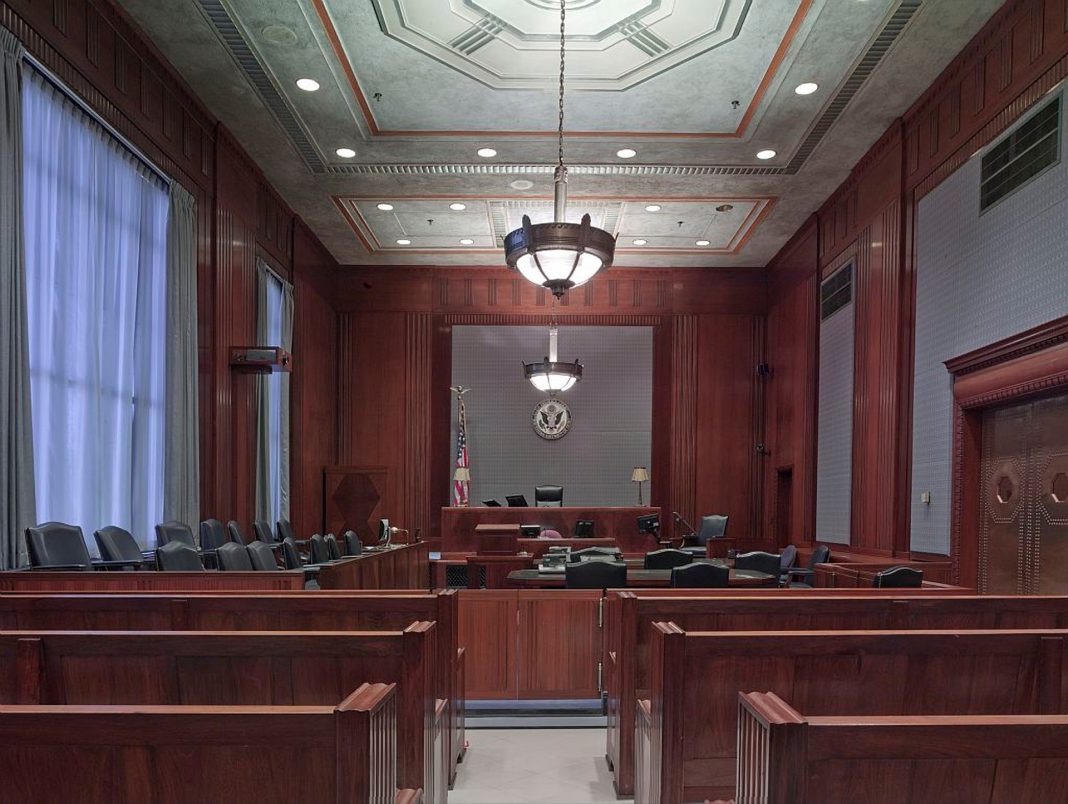 |
|
| Issue #82 • July/August, 2003 |
You are hereby summoned to appear for jury trial service. Failure to respond will subject you to punishment for contempt, including a $1,000 fine, imprisonment for five days, or both.”
I understand that jury duty is my civic responsibility, but still when I got this jury duty notice my first thought was, “What a waste of time. How can I get out of this?” The thought of sitting all day in the jury box while lawyers argued back and forth manipulating facts in order to win their case just did not appeal to me. “There must be an excuse I can use to get out of this,” I thought.
Then I thought of several newspaper articles I had recently read. In one, a man in our city was sentenced to 42 years to life in prison under California’s “three-strikes” law, a law passed by voters to imprison violent criminals for life. Was this man’s third strike murder, rape, or assault? No, it was stealing a pair of tennis shoes. “That’s not right,” I thought, “Nor, is it the intent of the law.”
In another case, our local district attorney was quoted in the newspaper as saying he had asked a suspect to voluntarily come in to his office for questioning or else “We will kick your door in and drag you into the street.” Wait a minute. If the crime this person is accused of committing is so minor that he can drive himself to the office, why can’t the district attorney come to his house and knock on the door? Why would they have to drag him into the street? “That sounds like an abuse of power,” I thought.
Then I read about a local 16-year-old high school girl at a large party of high school friends. She apparently took off her clothes, ran around naked, yelled “What’s a girl have to do to get sex around here,” and then started having sex with multiple young boys at the party. Later, she began drinking liquor she brought to the party, continued with other boys, and passed out from the alcohol. Several boys under age 18 were charged with sexually assaulting her after she passed out. There is no question the boys are at fault and, if guilty, the boys do deserve punishment. Also, there is no question that her actions caused her own problems. It was the actions of the district attorney that got my attention, however.

The boys were given the choice to “voluntarily” plead guilty within five days and attend a “diversionary program” without jail time or else they would be charged as adults, facing eight years in prison and being required to register as sex offenders for the rest of their lives. Not much of a choice.
“Wait a minute,” I thought, “Either the crime they are accused of warrants a diversionary program or prison as an adult. Which is it”? Also, “What happened to their constitutional right to a fair trial?” Is the district attorney worried he cannot get a conviction if the jurors consider the girl’s actions that night.
Now I knew why I needed to comply with the summons for jury duty. I needed to be there to determine innocence or guilt, but even more so I needed to be there to make sure the defendant received a fair trial and was not “railroaded” by the district attorney.
This was not normal thinking for me. I am an average American citizen who supports my government and police and who is fed up with increasing crime. I believe the police and courts are trying to protect us from criminals. However, more and more, I am disturbed by the loss of our freedoms and our rights, and their attempt to win convictions at all costs.
My “day in court”
On the day of jury duty, I was one of more than 100 people called as prospective jurors for a particular trial. All had taken off work or stopped their daily lives in order to do their civic responsibility. Either that, or the threat of five days in jail for not showing up got their attention. I figured it must be an important trial to need so many prospective jurors.
When we were in the courtroom, I could see a clean-cut young man at the defendant’s table. The judge began. “The defendant is accused of spray painting the front door of a business. The charge is vandalism under $400, a misdemeanor.”
My first thought was, “What! You took all of us away from our work and lives for this?” My next was, “Wait a minute. This is so minor that I’m sure he could have plea-bargained this charge away if he was guilty. I’ll bet the guy is innocent and he wants his day in court.” Now I really wanted to be on the jury.
The judge continued. “As jurors, you are required to enforce the law even if you disagree with it. You must use the evidence presented and what you are told the law is as you deliberate this case. You cannot consider anything else. You cannot judge based on your beliefs about the law being right or wrong.”
This did not sound right to me. I always believed that a juror has the right and responsibility to use their conscience in making a decision. The instructions given by the judge seemed like a way to manipulate outcome of the trial.
Then I remembered another case. Bryan Epis was charged in Sacramento Federal Court with a four-count federal indictment for “conspiring to manufacture 1000 marijuana plants,” a crime which carries a mandatory 10-year prison sentence.
While a federal crime, he was co-founder of Medical Marijuana Caregivers and was operating legally in accordance with California’s medical marijuana law established in 1996 by Proposition 215. Under this law, he was allowed to provide marijuana to seriously ill patients who had a doctor’s prescription.
Whether or not one believes that the law or the use of marijuana is right, it was the actions of the federal prosecutors and the court that bothered me. The first federal attorney involved in this case offered Mr. Epis four months of house arrest in exchange for a guilty plea without a trial. Wanting the trial he is guaranteed by the Constitution, he refused.
A new federal attorney took over the case and offered him four years in prison in exchange for a guilty plea. When Mr. Epis again refused, the federal prosecutor filed charges that carried a mandatory 10-year prison term.
Now I was really confused. Was the crime so minor that four months of house arrest is appropriate, or was it so serious that he deserves 10 years in prison? Or, is the government trying to deny him his right to a trial by threatening a long prison term if he does not plead guilty “voluntarily?” “No problem, he will receive a fair trial and the jurors will decide,” I thought.
Suppressing evidence
Unfortunately, that is not how it works anymore. The information the jury is told is severely restricted. They are given just what government (the judge and prosecutors) decide is appropriate, rather than all the facts needed to make an informed decision.
In this case, jurors were not allowed to hear about California medical marijuana laws or the reasons he grew the marijuana. The prosecutor even sought a gag order so the case would not be reported in the newspaper. “If the jurors see that there is a mandatory 10-year sentence, I don’t see how the government can receive a fair trial,” argued the federal prosecutor.
“Wait a minute,” I thought, “Isn’t it the defendant who has a right to a fair trial? Where does it say the government has such a right?”
Bryan Epis was convicted and sentenced to the mandatory 10 years in prison. A juror said afterwards that he would not have convicted him if he had known the sentence. So much for a defendant receiving a fair trial.
Today, there are many obstacles to a defendant receiving a fair trial, including bad laws, inappropriate application of laws, and manipulating the information juries can hear.
Bad laws come from many directions. Elected legislators at all levels of our government have swamped us with a tremendous number of laws, many valid and many not. Even good laws are applied inappropriately, as in the case of the man sentenced to 42 to life for stealing a pair of tennis shoes. It was a good law intended to remove violent criminals from society, but wrongly applied to an act of petty theft.
Unelected bureaucrats increasingly have the power to write and enforce regulations that have the effect and consequences of law, often without the right to a trial. Federal and state tax, environmental protection, and occupational safety agencies are all prime examples of such regulatory bodies.
Even the U.S. Constitution is constantly under attack. Unbelievably, in a case that is certain to be appealed to the U.S. Supreme Court, the Federal Appeals Court in San Francisco recently ruled that Americans do not have the right to own firearms as individuals, only the state-run militia can own guns. This is a surprising decision even for this notoriously liberal court.
Prosecutors also charge defendants with as many laws as they can find that remotely apply in order to overwhelm the defendant, often bending the laws to try to make them fit. They want a jury to think that with so many charges, the defendant must be guilty of something.
A children’s dentist in Pasadena, California, was unfortunate enough to have a patient die in her dental office during treatment, despite following standard care. She was arrested on felony child endangerment, her own children were taken from her, and she was charged with violating 81 laws by the district attorney. At trial, all 81 charges were either dropped or she was found not guilty. Some of the charges were clearly lies and there was no reason she should have been charged in the first place. Jurors stated the trial was a huge waste of taxpayer money. The district attorney and the State Board of Dental Examiners ruined her life without having a case.
Trials without juries
The Sixth Amendment to the Constitution of the United States gives the accused in criminal prosecutions the right to “a speedy and public trial, by an impartial jury of the State and district wherein the crime shall have been committed.” More and more, however, individuals are denied a trial at all.
In family court and cases by the IRS, jury trials are not allowed. Federal law and some state laws deny a trial in cases where the sentence that can be imposed is six months or less. They can charge a defendant with multiple crimes, each with a 6-month penalty that can run consecutively. Therefore, in an end-run around the Sixth Amendment, an accused can be sentenced to years in prison without a jury trial. The government tries to avoid a trial whenever possible, knowing that many cases would be thrown out if the juries realized how the laws were being applied.
Stacking juries
Our jury system is certainly not impartial. There are problems with how the jury is selected and the instructions they are given.
“Failure to respond will subject you to punishment for contempt, including $1,000 fine, imprisonment for five days, of both,” was the statement that made me show up for jury duty. I wondered how many individuals don’t even bother to respond to the summons for jury duty. I asked the court clerk, and, while avoiding directly answering the question, he said, “We send them a summons to see the judge, and if they ignore that a warrant is issued for their arrest.” Forcing people to serve on juries is not a way to find impartial jurors.
Of the 100 or so of us summoned for the “graffiti trial,” 16 names were randomly called. The judge informed them they were required to follow what they were told the law was, regardless of whether they agreed with it.
They were first questioned regarding whether they could be present the dates of the trial and a number were excused due to schedule conflicts. Sometimes, potential jurors are excused due to the length of the trial being a financial hardship. Often, these will be self-employed or other hard-working individuals who are not paid by their employers while they are on jury duty. This leaves government employees, welfare recipients, retired individuals, some workers of large corporations, and others with “time on their hands” as the main source of jurors.
The judge then excused some jurors because they had heard about the case or knew someone involved in the case. As potential jurors were excused, someone else from the group of 100 would randomly be called to fill their spot.
Next, both the prosecution and defense asked questions to each juror. They both have “peremptory challenges” in which they can remove a potential juror for no reason. This is where they “stack the deck” in their favor by trying to include those who may be sympathetic to their case while removing those who may not. Lawyers also use peremptory challenges to try to adjust the racial and gender make-up of the jury to favor their side.
One young man looked baffled and embarrassed as he was excused without an explanation. While no reason was given, I noted that he was an engineering student. Lawyers typically don’t want engineers or others who are too analytical on a jury since they may think the case out rationally. Jurors with education, strong convictions, and knowledge are routinely excluded from juries. Defense lawyers I have spoken with said that prosecutors try to have a jury of impressionable people who have about a seventh grade education and who won’t think about the case on their own. They want to be able to easily persuade them.
The problem with juries doesn’t end with their selection. The judge and prosecutor control the testimony and the instructions that jurors are allowed to hear. The “whole truth and nothing but the truth” is not heard by the jury, only the information the judge decides should be heard. The judge determines the evidence that is admissible or inadmissible, the importance to be given to any evidence, and then requires jurors to consider only this information.
Many jurors have a problem with this. They want to be told the whole truth and then be allowed to decide the case. How can you judge the case unless you know all the facts?
Twelve jurors were finally selected for my case. Unfortunately, I was one of the many jurors not selected or even questioned. I left not knowing if this man was found innocent or guilty, but knowing that I needed to learn more about the rights of jurors.
What can a juror do?
Since it is pretty clear that it is hard, if not impossible, for a defendant to receive a fair trial today, what can a juror do? We all want criminals off the streets, but jurors are the only people who can make sure the defendant receives a fair trial.
The following is not something jurors will be told or something that the court wants them to know, but it has been so ever since the common law jury system was established almost 800 years ago.
On June 15, 1215, England’s King John signed the Magna Carta (Great Charter) establishing liberties and rights of the population. Among other things, this established the principle of the right to a jury trial and the right and duty of the jurors to determine and judge the facts, to judge the justice of the law, and to declare the accused innocent. The intent of powers given to the jury was to protect citizens in case the government became too powerful and established laws violating the rights of the people.
The Magna Carta later became the basis of our liberties and Constitution. America’s founding fathers also worried that the government they were creating could become powerful and corrupt, threatening the rights and liberties of Americans.
In the Constitution and the Bill of Rights, they provided the right to a trial by a jury of one’s peers as a method to protect citizens from the power of an over-zealous government. A jury can refuse to convict a defendant who has clearly violated the letter of the law if they feel the law is unjust or unconstitutional, essentially vetoing the effect of the law.
In early America, jurors were told of this right and writings of our founding fathers show this was their intent. John Adams stated in 1771 “It is not only…[the juror’s] right, but his duty … to find the verdict according to his own best understanding, judgment, and conscience, though in direct opposition to the direction of the court.”
In 1789, future President Thomas Jefferson stated, “I consider trial by jury as the only anchor yet devised by man by which a government can be held to the principles of its constitution.”
Things changed as time went by. A Supreme Court ruling in 1895 found that judges were not at fault if they failed to remind jurors of this right. After that, judges not only stopped telling jurors they can judge the law, they now falsely tell jurors their only job is to decide if the evidence is sufficient to find the accused guilty. They are told they must do this even if they disagree with the law. Defense attorneys can be charged with contempt of court if they inform jurors that they may acquit if they feel the law is unconstitutional, unjust, or applied unfairly.
Jurors’ real responsibilities
Throughout the history of America, juries have protected our freedoms by refusing to find an accused guilty of a law they felt was wrong. By refusing to convict an accused, they essentially have vetoed bad laws.
As early as 1735, a printer named John Peter Zenger was accused of seditious libel for publishing an article critical of colonial rule in violation of a law requiring government approval of anything critical of the government. Mr. Zenger admitted to publishing the article, stating that the facts justified publication. The judge stated that truth was no defense for violation of the law and the jury could not consider the truth. Disregarding the judge’s instructions, the jury found Mr. Zenger not guilty.
When enough juries acquit defendants that have clearly violated a law, the government eventually stops trying to enforce the law. The Salem witch trials in 1693 were stopped after 50 defendants in a row were acquitted. Before the Civil War, Northern juries refused to convict individuals accused of assisting escaped slaves in violation of the Fugitive Slave Act, effectively stopping the law. During Prohibition in the 1930s, convictions of bootleggers and speakeasy owners became rare as jurors refused to convict the accused, despite the 18th Amendment and the Volstead Act. Essentially, they vetoed the law and prosecutors eventually stopped bringing cases to trial. Subsequently, the law was overturned.
Over the years, most of these jurors probably just voted their conscience, not even realizing they had a legal right to judge the law. Many had been told by the judge to only deliberate on the facts presented and not question the fairness of the law.
Each juror has the power to affect change. There is nothing that requires a jury to reach a unanimous verdict. Under criminal law, only one juror must find the accused not guilty for him to be not convicted. When a jury decides to acquit a defendant, the decision is final and cannot be overturned. The judge cannot harass or punish jurors for voting their conscience and they may be asked, but not forced, to explain their verdicts.
If you are called for jury duty, it is an opportunity to protect the rights of the accused and, by doing so, your own rights and freedoms. Most of the time the law will probably be constitutional and, hopefully, applied justly. What can a juror do if it is not?
First of all, understand that nothing in the Constitution or Supreme Court decisions requires a juror to take an oath to follow the law as explained by the judge. As a juror, when you in good conscience believe that the law is wrong or unconstitutional, is being applied unfairly, the accused is being unjustly charged or made “an example of” by the government, you have the right and responsibility to find them not guilty, despite what the judge or your fellow jurors say. Remember, your one not guilty vote is all that it takes to prevent conviction. You will get the credit or blame for the results of the trial and will have to live with your decision.
The practice of a juror using their conscience to find a defendant not guilty because the law is unjust has been called jury independence, jury veto, jury discretion, jury referendum, or, commonly by the media, as jury nullification.
Jury nullification is essentially when an accused individual is acquitted of a crime that he clearly committed because the jury feels there are extenuating circumstances, feels the law is unjust or applied unfairly, or because the sentence is too harsh for the crime.
While historically a legal right, judges and prosecutors today fear an informed jury as a loss of their power. Sometimes, the only way the government can get convictions of bad laws is to tell jurors they are required to uphold the law and to bar them from the jury if they disagree. Judges have even told jurors that they may not consider the U.S. Constitution in their deliberations.
Prosecutors fear the jury that has all the information, for they may find the government’s case or the punishment to be absurd. Do you think a jury would have convicted the man for stealing tennis shoes if they knew he would receive a life sentence? The jurors in Brian Epis’ case said they would not have convicted him if they knew he faced a mandatory 10-year sentence.
Jurors will routinely be disqualified if they question the law, if they disagree with the law, or if they question the constitutionality of the law. They are also disqualified if they agree with the concept of an informed jury or of jury nullification. Judges who are hostile to jury nullification have even used their power of “contempt of court” to jail jurors, without a trial, if they believe in or discuss jury nullification with other jurors. An informed jury scares the court like nothing else.
To get more information
For more information on jury rights and what you can do, contact the Fully Informed Jury Association (FIJA), an organization started to inform jurors of their powers and rights, at www.fija.org, P.O. Box 5570, Helena, MT 59604-5570. [Phone: 1-406-442-7800. To get a Free Jury Power Information Kit: 1-800-TEL-JURY. Ed.]
Also, inform others about jury rights by talking with your friends or writing letters to local newspapers. The more jurors that are aware of their rights, the better our justice system will be.
In America today, our individual rights and freedoms are under constant attack and it is the duty of all of us to defend them. Read the Constitution and know your rights as a citizen. If called as a juror, don’t immediately look for an excuse to get out of jury duty. Rather, be happy that you can use your right to analyze the case and to vote your conscience to ensure a fair trial. An informed jury is the way we have to stand up to a powerful government.















if it were truly only about enforcing the law, a jury would not be needed, only a computer. The reason for a jury is not only about the law, but about justice.